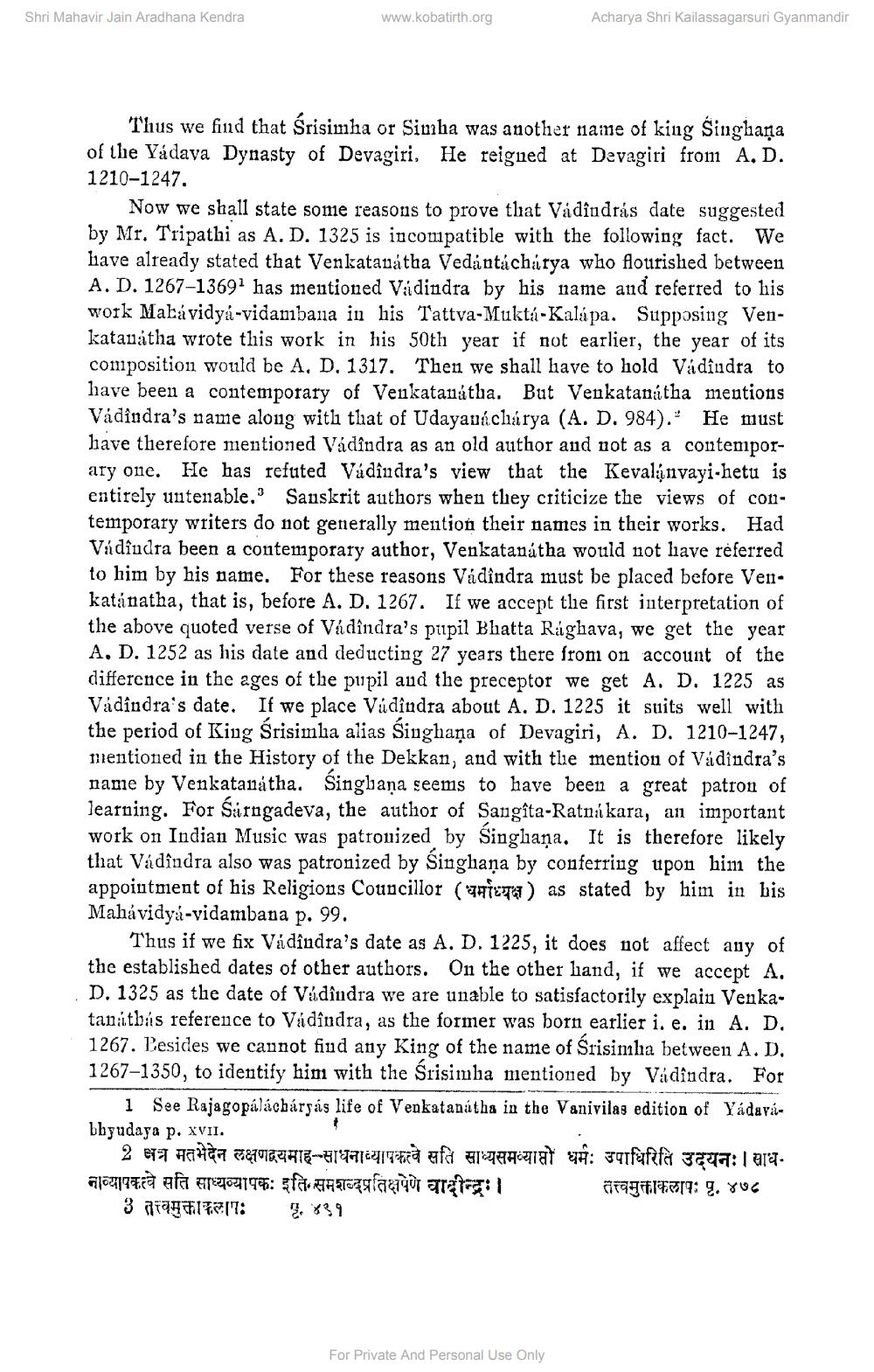________________
Shri Mahavir Jain Aradhana Kendra
www.kobatirth.org
Acharya Shri Kailassagarsuri Gyanmandir
Thus we find that Śrisimha or Simha was another name of king Singhaņa of the Yádaya Dynasty of Devagiri, He reigned at Devagiri from A. D. 1210-1247.
Now we shall state some reasons to prove that Vådîndrás date suggested by Mr. Tripathi as A. D. 1325 is incompatible with the following fact. We have already stated that Venkatanatha Vedantacharya who flourished between A. D. 1267-13691 has mentioned Vadindra by his name and referred to his work Mahavidya-vidambana in his Tattva-Muktá-Kalápa. Supposing Venkatanátha wrote this work in his 50th year if not earlier, the year of its composition would be A, D. 1317. Then we shall have to hold Vadîndra to have been a contemporary of Venkatanátha. But Venkatanátha mentions Vádîndra's name along with that of Udayapáchárya (A. D. 984). He must have therefore mentioned Vádîndra as an old author and not as a contemporary one. He has refuted Vádîndra's view that the Kevalányayi-hetu is entirely uutenable, Sanskrit authors when they criticize the views of contemporary writers do not generally mention their names in their works. Had Vádîndra been a conteniporary author, Venkatanátha would not liave referred to him by his name. For these reasons Vádîndra must be placed before Venkatánatha, that is, before A. D. 1267. If we accept tlie first interpretation of the above quoted verse of Vádîndra's pupil Bhatta Raghava, we get the year A, D. 1252 as his date and deducting 27 years there from on account of the difference in the ages of the pupil and the preceptor we get A. D. 1225 as Vådîndra's date. If we place Vadindra about A. D. 1225 it suits well with the period of King Srisimlia alias Singhaņa of Devagiri, A. D. 1210-1247, mentioned in the History of the Dekkan, and with the mention of Vádindra's name by Venkatanátha. Singbaņa seems to have been a great patron of learning. For Sirngadeva, the author of Sangîta-Ratná kara, an important work on Indian Music was patronized by Singhaņa. It is therefore likely that Vádîndra also was patronized by Singhaņa by conferring upon him the appointment of his Religions Councillor (anizma) as stated by him in bis Mahavidya-vidambana p. 99.
Thus if we fix Vadindra's date as A. D. 1225, it does not affect any of the established dates of other authors. On the other hand, if we accept A. D. 1325 as the date of Vádîndra we are unable to satisfactorily explain Venkatanthus reference to Vádîndra, as the former was born earlier i. e. in A. D. 1267. Besides we cannot find any King of the name of Srisiniha between A. D. 1267-1350, to identify him with the Śrisimha mentioned by Vádindra. For
1 See Rajagopáláchárgás life of Venkatanátha in the Vanivilas edition of Yadavábhyudaya p. XVII.
2 भत्र मतभेदेन लक्षणद्वयमाह--साधनाध्यापकत्वे सति साध्यसमध्याप्तो धर्मः उपाधिरिति उदयनः । साध. नाव्यापकत्वे सति साध्यव्यापकः इति समशब्दप्रतिक्षपणे वादीन्द्रः।
तत्त्वमुक्ताकलापः पृ. ४७८ 3 2194#177117: 1439
For Private And Personal Use Only




